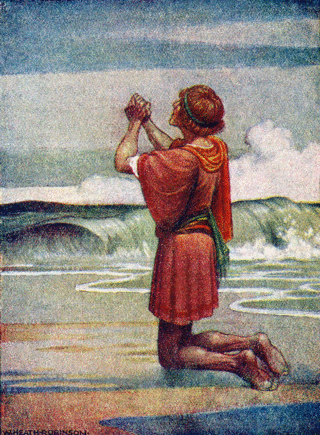
Freudian Psychology
Dismantling the Oedipus Complex
Thoughts on a new model of parenthood.
Posted May 7, 2020

When Freud was searching for a metaphor to describe children’s shifting attitudes towards their parents as they develop, he settled upon the Greek myth of Oedipus. Most famously depicted in Sophocles’ Oedipus Rex, Oedipus is a tragic figure who inadvertently kills his father and marries his mother. As Freud saw it, all children desire their opposite-sex parent and feel they are in competition with their same-sex parent.
Perhaps no other element of Freud’s thought seems as wrong-headed and alien to modern ears; when I teach psychoanalytic theory, the Oedipus complex is undoubtedly the section that draws the most incredulous stares. Progressive critiques of Freud have often asked whether we should take his ideas as proscriptive or descriptive; that is, is the Oedipus complex something meant to describe all human history or rather an artifact of early 20th century patriarchal society? Freud clearly believed the former, but the latter helps us gain a better grasp of what he was getting at. What then should replace Oedipus? In Massimo Recalcati's recent book, he argues that Telemachus better captures the state of modern parenthood in his aptly named The Telemachus Complex.
In Homer’s The Odyssey, Telemachus is the son of Odysseus and Penelope who has lived with his mother since his father left when he was an infant to fight in the Trojan War. Recalcati believes the figure of Telemachus captures the modern yearning for a father, but not the father of Oedipus: “the father invoked today can no longer be the father who has the final word on life or death, or on the meaning of good and evil; he can only be a father who is radically humanized, vulnerable, incapable of revealing the meaning of life but capable of demonstrating, through the testimony of his own life, that life can have meaning” (emphasis original). Children are no longer looking for the looming figure of authority of days past (if they ever were, but that’s beyond the scope of the book) but are looking for a father who demonstrates that life is worth living despite the travails of modern life. Recalcati mostly focuses on fathers, both for theoretical and practical reasons, but I would contend that this applies equally to all sexes.
Recalcati is not nostalgic for the time of the patriarchy, but he does believe that the collapse of fatherhood has left a power vacuum that remains unfilled and usually results in the injunction to enjoy oneself without limit which is, paradoxically, terrifying. Pleasure is desirable, but when one is commanded to enjoy the pleasure fades. Recalcati draws strongly from Lacan’s theory of fatherhood in this section. He sees modern fathers as variations upon Peter Pan, refusing to grow up and consequently failing to help their children develop.
Children do not need the stern and imposing figure that Freud imagined, nor do they need a parent who responds to them as a friend. In these trying times, perhaps the best thing we can do for our children is to do precisely what Recalcati imagines, showing our children that life has meaning and beauty even in the midst of deprivation and loss.

